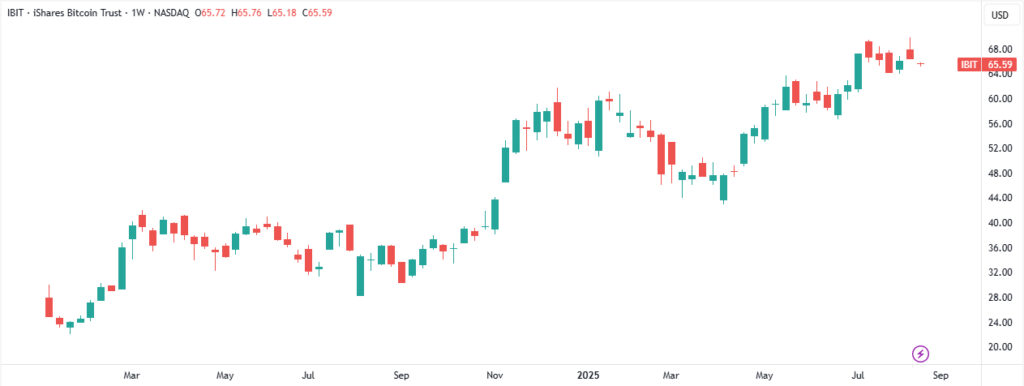Since the U.S. Securities and Exchange Commission (SEC) greenlit the first spot Bitcoin Exchange-Traded Funds (ETFs) in early 2024, the financial terrain has undergone a significant transformation. This pivotal approval marked the dawn of a new era, ushering Bitcoin into the mainstream investment universe and bridging the once formidable gap between conventional financial mechanisms and the burgeoning realm of digital currencies.
Historically, Bitcoin’s allure lay in its promise of decentralization and potential for significant returns. Yet, the complexities and technicalities – such as managing wallets and private keys, navigating the often intricate landscape of cryptocurrency exchanges, and grappling with security concerns – have been substantial barriers to entry for the average investor. The introduction of spot Bitcoin ETFs has dramatically changed this narrative, offering a simplified, regulated avenue for investing in Bitcoin through well-trodden paths of traditional brokerage and retirement accounts, akin to purchasing stocks or mutual funds.
These innovative investment vehicles have democratized access to Bitcoin, allowing investors to partake in the cryptocurrency’s price movements without the direct ownership of the asset. This development is particularly appealing not only to crypto-enthusiasts seeking a more straightforward entry point but also to seasoned investors aiming to diversify their portfolios with digital assets. Spot Bitcoin ETFs have effectively married the fast-paced, groundbreaking world of cryptocurrency with the stability and familiarity of traditional investment structures, promising a tax-efficient, regulated method of investment that circumnavigates much of the original complexities associated with digital currency investments.
In light of these developments, a myriad of Bitcoin ETFs have emerged, each boasting unique strategies, fee structures, and performance metrics. Yet, the decision to invest in a Bitcoin ETF should not be taken lightly. Prospective investors must navigate a landscape peppered with various considerations to pinpoint the ETF that aligns with their investment goals, risk tolerance, and financial strategy.
Key Considerations in Selecting a Bitcoin ETF
-
Expense Ratio: An essential factor to consider is the fund’s expense ratio, representing the annual fee as a percentage of your investment. Even seemingly negligible fee discrepancies can accumulate, materially impacting returns over time, especially given Bitcoin’s notorious volatility.
-
Liquidity: Liquidity, or the ease with which you can buy and sell shares without significantly impacting their price, is another crucial aspect. ETFs with higher trading volumes generally offer better liquidity, facilitating smoother entry and exit strategies.
-
Tracking Accuracy: The ETF’s ability to accurately mirror the price movements of Bitcoin is paramount. Spot ETFs, which directly hold Bitcoin, tend to offer closer tracking compared to their futures-based counterparts, which might suffer from discrepancies due to factors like roll costs and contango.
-
Reputation and Trust: The credibility of the issuing firm is instrumental in ensuring peace of mind. Established institutions with a sterling track record of regulatory compliance and operational excellence can mitigate risks associated with counterparty and administrative complexities.
-
Custody and Security: Understanding how and where the Bitcoin underlying the ETF is stored is vital. Top-tier institutions offer robust security measures, including institutional-grade cold storage solutions and insurance protections, safeguarding investors against the perennial concerns of hacking and theft.
As we delve into the offerings, it’s clear that the landscape is diverse, ranging from ETFs like the iShares Bitcoin Trust and Fidelity WiseOrigin Bitcoin Fund, renowned for their robust liquidity and security measures, to innovative solutions like the ARK 21Shares Bitcoin ETF, blending traditional investment practices with the cutting edge of cryptocurrency. Others, such as the Bitwise Bitcoin ETF Trust, stand out for their emphasis on cost efficiency, while the likes of the 2x Bitcoin Strategy ETF cater to those seeking amplified exposure with an acceptance of higher risk.
Conclusion
The advent of Bitcoin ETFs represents a watershed moment in the convergence of traditional finance and digital assets, providing a regulated, accessible pathway for investors to tap into the digital currency revolution. With the array of options burgeoning, investors are empowered to select from a suite of offerings that best align with their financial objectives and risk appetite. However, as with all investments, due diligence is paramount. The onus is on the individual investor to thoroughly vet each prospective ETF, considering factors such as fees, tracking accuracy, liquidity, provider reputation, and security arrangements.
Disclaimer
Please note, the information provided here is intended for informational and educational purposes only and should not be construed as financial, investment, or legal advice. The volatile nature of cryptocurrency investments presents a risk of loss, and it is advisable to conduct comprehensive research or seek the guidance of a licensed financial advisor before embarking on any investment ventures.



